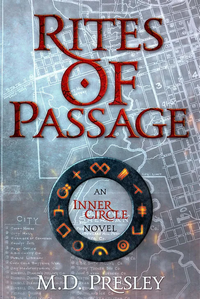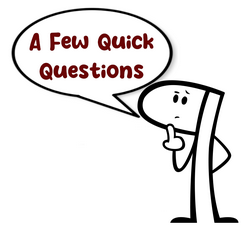Today is Publication Day for Rites of Passage the first book in the Inner Circle Urban Fantasy series. Here’s a quick description:
 Corbin James has never been so lost. Able to dowse since a kid, he’s adept at finding missing things. But after weeks on the run from the FBI, the teen’s luck has finally run dry.
Corbin James has never been so lost. Able to dowse since a kid, he’s adept at finding missing things. But after weeks on the run from the FBI, the teen’s luck has finally run dry.
Enter the enigmatic Mister with a tempting offer: find an enchanter who has disappeared inside the mysterious Harmon House. Recruited into a reluctant crew of motley magicians, Corbin only has days to navigate their shifting loyalties to earn his freedom by entering the Inner Circle.
Lucky for him he’s got his trusty dowsing rod, a defaced 50-cent piece, and enchanted iPod.
I’m really looking forward to reading this. In honor of Publication Day, I have a quick Q&A with the author, M.D. Presley. I had to come up with these questions before starting the book, which I’ve only done once before. I think it came out not-terribly-awkward. Either way, I enjoyed reading the answers and hope you will, too.
Why don’t you take a moment to introduce yourself to the readers, and tell us about your books in general, before hitting us with an elevator pitch for Rites of Passage?
Greetings, mortals. I am Matt, and I write as M. D. Presley. I’m a screenwriter by training, with a few shows and movies released in China, although I don’t speak a lick of Mandarin. Publishing is my outlet for the stories that I actually want to tell, which are not constrained by such paltry things as budgets or directors. Or censors.
Rites of Passage is an urban fantasy mystical murder mystery that’s miraculously not in the Dresden or Anita Blake molds. It’s a whodunnit involving a young dowser who’s pressed into finding an enchanter that’s gone missing in his own home. It harkens back to the non-noir mysteries from yesteryear, in that you could almost call it cozy if you only went by body count. But it’s got a little too much cosmic and body horror for that.
It’s my love letter to 90s Vertigo comics, where the urban fantasy is always just around the corner or hiding in the shadows, but is wonderous if you have the right set of eyes to see it. But it’s also strange and a little bit frightening.
Looking over your website, worldbuilding is something you’ve spent a lot of time thinking about it—not only implementing it in two pretty distinct fictional worlds—but you’ve got some books about it geared for writers. Hopefully, I’m not asking you to say anything that makes buying one of those books moot here. But what are the big things that an author should think about before trying to create a fictional world—what are a couple of the big mistakes people tend to make as they learn the hard way how to do this?
I’ve spent a few hundred pages and many YouTube hours trying to sum up the idea of purposeful worldbuilding, so I’ll give one half-useful conceptual answer and one practical one.
Conceptually, practice the old Bruce Lee adage of use what works and discard the rest. I stand by a “tools not rules” approach, which means you should be open to learning everyone’s theories and techniques, and then distill the ones that work for you without ignoring what you’ve learned from the discarded bits. I’m personally a big top-down designer and cannot write by a bottom-up, discovery approach. However, I’ve studied those approaches and use them when they’re appropriate in my own writing.
Basically, worldbuilding is always a process in progress.
Practically, my biggest word of advice is to keep a bible of your world, characters, and plot. It doesn’t have to be terribly in-depth, but it’s good to have it all in one place. And if you do keep one with characters JOT DOWN THEIR PHYSICAL DESCRIPTIONS. Nothing is worse than combing through hundreds of pages of your own writing just to determine if your own creation is brown-haired or left-handed. Doing so is probably the fastest way to turn something you love into homework.
For you, at the end of the day—creating believable characters, worldbuilding, or the story—what’s harder? What’s more rewarding? What do your readers tend to react to the most?
It’s trite, but I’ve learned how characters, plot, and worldbuilding all need to balance and feed into one another. I was a big plot-proponent in my early days, and took a long time to understand I needed to spend equal time on the characters so the audience would actually want to know what happens to them in the plot. Worldbuilding is the same way in that it can be enchanting in terms of its details and scale, but it’s just window dressing without vibrant characters populating it. Mark JP Wolf points out that worlds can exist without stories, but stories cannot exist without worlds, which just underscores the symbiotic nature of the three of them.
At this stage in my career, I feel I have a pretty good balance on the three of them. Which means I should probably start focusing my attention on my wooden prose.
No matter how many books you have under your belt, as I understand, each novel/series tends to be a different experience than the one(s) before. What was the part what was the biggest surprise about the process of writing Rites of Passage? Either, “I can’t believe X is so easy!” or “If I had known Y was going to be so hard, I’d have skipped this and watched more TV”?
This sounds dumb after just saying I’m a top-down designer who focuses on plot, but Rites of Passages reiterated how much I need to know what happens in the story before I sit down to write it. Especially when it’s a mystery. Traditional plotting methods may tell you what needs to happen in the story for that beat to function, but I learned the hard way that I really need to design the villain’s plans and motivation ahead of time. If the villain’s plans don’t make sense from their perspective, then the story’s logic will eventually break down, no matter how well the plot holds together from the hero’s perspective.
I’ve taken this hard-won lesson to heart as I plot out the villains first in the sequel, and the process has sped up considerably.
Is there a particular supporting character that ended up becoming a favorite of yours? Do you ever start to wonder if a supporting character should’ve been the protagonist? Talk about them a little bit and how the reaction is different. What’s the key, for you, in writing a great supporting character, and how did that (if you can manage this without an essay) work with this particular character?
In screenwriting it’s understood that supporting characters are more fun to write because they can be over the top, since they’re not carrying the show. They can be outlandish and weird because not nearly as much is riding on them, which is why they have the freedom to become fan favorites. And I have a feeling that in Rites of Passage Kirin will be this character for me.
She’s a bit of a manic pixie dream girl in the first book, but that portrayal is also because we’re encountering her through the eyes of a young man. But she’s going to show up in many more of the books, and her character will get to show more facets throughout, both because she gets more screen time, and because the protagonist’s understanding of the world matures. In fact, I think she probably has a bigger arc than even the protagonist.
What’s next for M.D. Presley, author? Does that depend on the reaction to Rites of Passage or are you already neck deep in your next project or five?
I have material for about eight more books in this series, The Inner Circle, and am already at work on the second one. I’m juggling some screenwriting gigs with it, which is annoying since you never know when or if they’ll pop up to derail my writing momentum. On the worldbuilding front, I’m hoping to put together a free book detailing my method for understanding fantasy magic systems, which is currently scattered around on my website.
Thanks for your time and participation! I’m looking forward to seeing what Rites of Passage has to offer!
Hopefully by now, reader, you’re thinking you’d like to look into Presley’s work. Go check out his website, and show him the Release Day love and order Rites of Passage!



2 Pingbacks